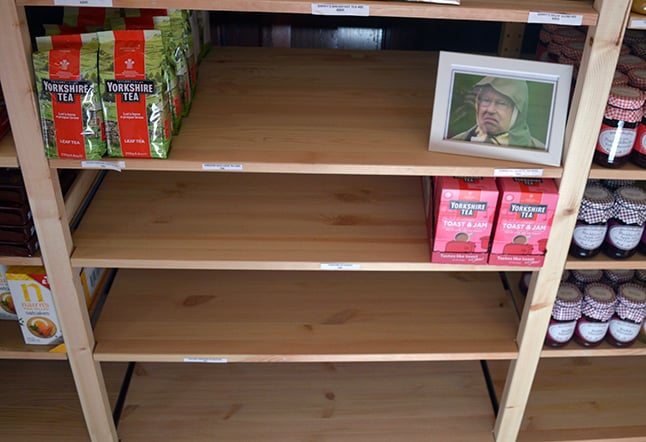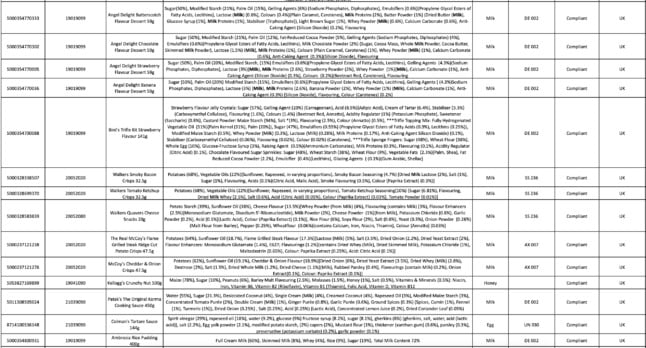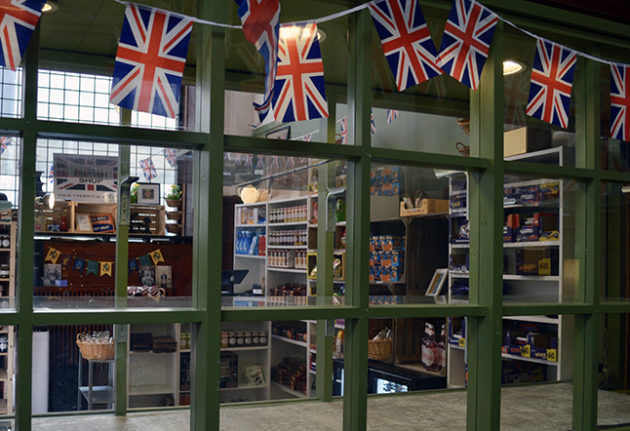There was nothing wrong with the food, but it came from the UK and according to post-Brexit EU regulations, any consignment of food from outside the European Union has to undergo document and identity checks in customs before being allowed to enter an EU country.
Due to an error in how the pallets were marked, (they weren’t marked with ‘border control’) the food was moved to a warehouse without being approved by customs at the port.
The business who bought the shipment, The British Shop in Gothenburg, was given two options: either destroy the entire shipment or send it back to the UK. They are just one of the small businesses affected by a lack of information on post-Brexit imports.
“We knew [Brexit] was going to be tough but it’s just been impossible to get anything done,” said Rosie McClune, one of the owners of the shop.
“Usually an order would take five days and now it’ll take five weeks to get here,” McClune told The Local. The shop was expecting the delivery on May 24th.
The British treats and condiments they sell are very popular with the English-speaking immigrant community in Gothenburg. But lack of stock meant the shop had to close over the weekend.
After waiting five weeks and hiring customs agents to make sure all the paperwork is in order, the shop still hasn’t been able to receive their goods and shelves are getting emptier.
A recent survey from the Confederation of Swedish Enterprise (Svenskt Näringsliv) found that 80 percent of Swedish companies which trade with the UK have had or expect problems with post-Brexit bureaucracy.
More than 40 percent of the companies said they’ve experienced or expect major problems with customs duties.
Henrik Isakson, manager for trade policy at the Confederation of Swedish Enterprise, said that “it’s all about people in the end, who might interpret legislation in different ways.”
It’s nothing new that businesses are struggling because of Brexit, but this situation is “just a big shit-show,” as McClune put it.

The shop has had to reach out to the British Ambassador for help. While McClune says that the Embassy has been really helpful, she said the Swedish administrators don’t know the new rules.
“This just can’t go on, not just for us but for everyone,” McClune said. “It’s just so stupid the whole thing. I hate Brexit.”
Annika Sundström, Head of Border Control at Livsmedelsverket (the Swedish Food Agency), said food customs agents are just following the same EU rules as every member state.
“If consignments with food products are entering the EU territory without the mandatory border controls, the only option is a rejection of the consignment,” she said.
Sundström couldn’t comment on this particular case but told The Local that it’s very important that anyone planning on importing products from the UK to the EU, “informs themselves in detail about the rules before they order goods.”
Unless you’re fluent in EU trade policy jargon and laws, the information available on the Swedish Food Agency website is quite hard to digest. Certain links are broken and information isn’t always current.
“They don’t have a clue and neither do we,” McClune says. “They assume everybody is up on the lingo.”
Even the experts struggle.
Christopher Wingård from Sweden’s National Board of Trade says that the transition has been anything but smooth. “The first couple of months since Brexit have been very difficult for many companies, both in Sweden and in the UK. Since the agreement came late on Christmas Eve, there was essentially no time to prepare, for anyone,” he told The Local.
“When everyone is faced with an entirely new situation on a short notice, it is not surprising that there are issues,” Wingård added.
He says that smaller businesses have been hit harder.
“The EU rules for importing food are very strict and difficult to deal with, especially for small and medium sized companies,” he said.
It takes a while of digging through the website of the Swedish National Board of Trade (Kommerskollegium) to find out what rules apply. Non-EU goods need to be pre-registered before they arrive and before the rules changed in April, you needed an export health certificate for foods that contain animal by-products. Now, instead, you need to provide private attestations for those products.
Most of the snacks The British Shop are currently trying to import contain a very small percentage of dried milk or egg product – some as little as 0.35 percent – but they still count as composite products of animal origin.
As a result, the Swedish Food Agency has asked them to complete private attestation forms on the origins of each individual ingredient before the shipment can be released.

The EU is trying to make the process easier to understand with a website that lets you find the rules for a certain product, but it’s still quite cumbersome.
Each certificate is long and costs 1000 kronor to submit. Some of the details border on the ridiculous.
“One of the questions is actually ‘please provide proof there’s no milk in this marmalade’,” McClune said.
She hopes that importing from Ireland might be a way to avoid the complex bureaucracy of ordering crisps and chocolate from Britain, but it’s more expensive and they can’t get all their customers’ favourite products.
“Stuff like this is what kills businesses like ours,” the shop-owner said.
At the time of writing, the shipment was still at the port as McClune and her colleagues try to handle the mountain of paperwork, but they hope it will be released in the next few days.
In the meantime, they still have an empty shop.




 Please whitelist us to continue reading.
Please whitelist us to continue reading.
I wonder, when the dust settles, will Brits voting for Brexit think it helped or hurt Great Britain economically, and did their own economic situation improve as a result.